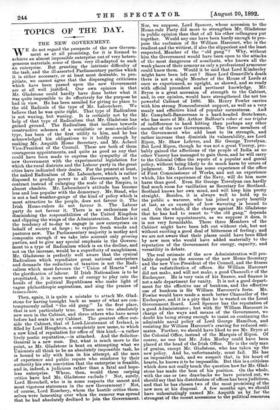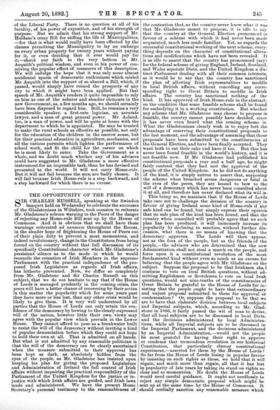TOPICS OF THE DAY.
THE NEW GOVERNMENT.
WE do not regard the prospects of the is Govern- ment as at all promising, for it s formed to achieve an almost impossible enterprise out of very hetero- geneous materials, some of them very ill-adapted to such an enterprise. But granting the intrinsic difficulty of the task, and the ill-assorted Parliamentary parties which it is either necessary, or at least most desirable, to pro- pitiate, we cannot agree that the disparaging criticisms which have been passed upon the new Government are at all well justified. Our own opinion is that Mr. Gladstone could hardly have done better what it was quite impossible to do effectively for the purpose he had in view. He has been assailed for giving no place to the old Radicals of the type of Mr. Lapouchere. We believe that he was quite right. That type of Radicalism is not waxing, but waning. It is certainly not by the help of that type of Radicalism that Mr. Gladstone has gained ground. The Radicalism that inclines towards constructive schemes of a socialistic or semi-socialistic type, has been of the first utility to him, and he has acknowledged his obligations to it boldly enough by making Mr. Asquith Home Secretary, and Mr. Acland Vice-President of the Council. These are both of them courageous appointments, and quite as good as any that could have been made to express the sympathy of the new Government with the experimental legislation for which the rural districts and the Labour party in the great cities have indicated their desire. For the present at least, the naked Radicalism of Mr. Labouchere, which is rather disposed to grudge power to all Governments, and to contract instead of enlarging the scale of the Empire., is almost obsolete. Mr. Labouchere's attitude has become less and less popular with the democracy. Mr. Stead, who is not a bad weather-gauge of the kind of policy which is most attractive to the people, does not favour it. The Irish Home-rulers do not favour it. The Labour party do not favour it. There is no enthusiasm for diminishing the responsibilities of the United Kingdom and clipping the wings of the Administration. Rather is it the tendency of to-day to engage in new enterprises on behalf of society at large ; to explore fresh woods and pastures new. The Parliamentary majority is motley and composite enough if we take into account only growing parties, and to give any special emphasis in the Govern- ment to a type of Radicalism which is on the decline, and not on the increase, would be a superfluity of naughtiness. Mr. Gladstone is perfectly well aware that the cynical Radicalism which repudiates great national enterprises and demands the reduction of taxation is not the Radi- calism which most favours the "Union of Hearts" and the glorification of labour. If Irish Nationalism is to be propitiated, it is mere waste of energy to play into the hands of the political Republicans who make light of vague philanthropic aspirations, and sing the praises of laissez-faire.
Then, again, it is quite a mistake to attack Mr. Glad- stone for having brought back so many of what are con- temptuously called "the old gang." In the first place, that is not particularly true. There are two absolutely new men in the Cabinet, and three others who have never before had seats in any Cabinet. The greatest office out- side the Cabinet, that of Lord-Lieutenant of Ireland, is filled by Lord Houghton, a completely new name, to which a new kind of reputation for office of this kind,—a rather lively poetic reputation,—is attached. And the Solicitor- General is a new man. But, what is much more to the point, as Mr. Gladstone is bent on attempting what we Unionists all think to be an absolutely impossible task, he is bound to ally with him in his attempt, all the men of experience and public repute who reinforce by their authority his own conviction that the enterprise is feasible, and is, indeed, a judicious rather than a fatal and hope- less enterprise. Whom, then, would these carping critics have had Mr. Gladstone exclude ? Not, surely, Lord Herschell, who is in some respects the sanest and most vigorous statesman in the new Government ? Not, of course, Lord Rosebery, whom the hostile critics them- selves were lamenting over when the rumour was spread that he had absolutely declined to join the Government. Nor, we suppose, Lord Spencer, whose accession to the Home.rule Party did more to strengthen Mr. Gladstone in public opinion than that of all his other colleagues put together. Would any one have been hardy enough to pro- poie the exclusion of Sir William Harcourt, who is the readiest and the wittiest, if also the slipperiest and the least respected. Member of the "old gang"? Why, without him the Government would have been open to the attacks of the most dangerous of assailants, who knows all the weak places of their armour as only a professional armourer could know them. Would it be said that Lord Kimberley might have been left out ? Since Lord Granville's death there is not a single Member of the House of Lords at once so experienced, so upright, so shrewd, and so ready with official precedent and pertinent knowledge. Mr. Bryce is a great accession of strength to the Cabinet, and, in our opinion, would have strengthened the not too powerful Cabinet of 1886. Mr. Henry Fowler carries with him strong Nonconformist support, as well as a very manly and effective kind of popular earnestness. And Mr. Campbell-Bannerman is a, hard-headed Scotc hman, who has more of Mr. Arthur Balfour's robur at aes triplex of indifference to hard hitting than perhaps any other member of the new Government. The three members of the Government who add least to its strength, and rather increase than diminish its vulnerability, are Lord Ripon, Mr. Shaw Lefevre, and Sir George Trevelyan. But Lord Ripon, though he was not a great Viceroy, pro- bably gained the affections of the people of India as no other Viceroy has managed to gain them, and he will carry to the Colonial Office the repute of a popular and genial policy, without being likely to do much harm by errors of judgment. Mr. Lefevre has some experience of the office of First Commissioner of Works, and not an experience which, like his experience of the Navy, will do him more harm than good. Even Sir George Trevelyan can hardly find much room for vacillation as Secretary for Scotland. Scotland knows her own mind, and will keep him pretty straight. Besides, it is always well to hold up to the public a waverer, who has joined a party heartily at last, as an example of how wavering is bound to end. On the whole, if the charge against Mr. Gladstone that he has had to resort to "the old gang," depends on these three appointments, as we suppose it does, it is not very formidable. These three Members of the Cabinet might have been left out without risk, but not without exciting a good deal of bitterness of feeling; and we are not aware that their places could have been filled by new men who would have added materially to the reputation of the Government for energy, capacity, and versatility in debate.
The real estimate of the new Administration will pro-. bably depend on the success of the new Home Secretary and the new Vice-President of the Council, and the fitness of the redistribution of offices. Sir William Harcourt did not make, and will not make, a good Chancelh.r of the Exchequer. He is very vain of his finance, and finance is not a safe department for vanity. It is not a good depart- ment for the effective use of bunkum, and the effective use of bunkum is Sir William Harcourt's forte. Mr. Fowler would have made a much better Chancellor of the Exchequer, and it is a pity that he is wasted on the Local Government Board. Lord Spencer has the reputation of a good Administrator ; but with Sir William Harcourt in charge of the ways and means of the Government, we doubt his being strong enough to insist on continuing the admirable naval policy of Lord George Hamilton, and restating Sir William Harcourt's craving for reduced esti- mates. Further, we should have liked to see Mr. Bryce at the Colonial Office, instead of the Marquis of Ripon. Of course, no one but Mr. John Morley could have been placed at the head of the Irish Office. He is the only man of genius, except Mr. Gladstone, who has taken up the new policy. And he, unfortunately, must fail. He has an impossible task, and we suspect that, in his heart of hearts, he knows it to be impossible. But this is a criticism which does not really touch the question how far Mr. Glad- stone has made the best of his position. On the whole, with the one or two drawbacks we have pointed out, we should say that his distribution of offices has been judicious, and that he has chosen two of the most promising of the new men at his disposal. A few months ago, we should have unhesitatingly named Mr. Asquith as by far the strongest of the recent accessions to the political resources of the Liberal Party. There is no question at all of his lucidity, of his power of exposition, and of his strength of purpose. But we admit that his strong support of Mr. Haldane's crazy Bill for stifling the life of Municipalities, —for that is what would really have been effected by the clauses permitting the Municipality to lay an embargo on every urban property for twenty years without paying for it, or even deciding that it ever would pay for it,—shook our faith to the very bottom in Mr. Asquith's political wisdom, and even in his power of con- ceiving the popular effect of measures of this description. We will indulge the hope that it was only some almost accidental spasm of democratic enthusiasm which misled Mr. Asquith into the support of so absurd a Bill, which, if passed, would simply have ruined the prospects of any city to which it might have been applied. But that speech of Mr. Asquith's renders it quite impossible to rely on him as one of the soberer and steadier elements in the new Government, as, a few months ago, we should certainly have been disposed to regard him. Still, he remains a very considerable speaker, a first-rate logician, an accurate lawyer, and a man of great general power. Mr. Aciand, too, is a man of power, and will be quite at home with the department to which he is appointed. He may be trusted to make the rural schools as effective as possible, not only for the education of the children in the narrow sense, but for their practical education in agriculture, mechanics, and all the various pursuits which lighten the performance of school work, and fit the child for the career on which he is most likely to enter. Take the Government as a whole, and we doubt much whether any of his advisers could have suggested to Mr. Gladstone a more effective instrument for an impossible task, than he has devised and presented to the world. It will not carry Home-rule. But it will not fail because the men are badly chosen. It will fail because Irish Home-rule is a step backward, and a step backward for which there is no excuse.



































 Previous page
Previous page